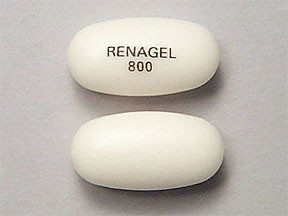SEVELAMER - ORAL
PHONETIC PRONUNCIATION: (seh-VELL-uh-mer)
COMMON BRAND NAME(S): Renagel, Renvela
GENERIC NAME(S): sevelamer HCl
Uses
USES: Sevelamer is used to lower high blood phosphorus (phosphate) levels in patients who are on dialysis due to severe kidney disease. Dialysis removes some phosphate from your blood, but it is difficult to remove enough to keep your phosphate levels balanced. Decreasing blood phosphate levels can help keep your bones strong, prevent unsafe buildup of minerals in your body, and possibly decrease the risk of heart disease and strokes that can result from high phosphate levels. Sevelamer works by holding onto phosphate from the diet so that it can pass out of your body.
How to use SEVELAMER - ORAL
HOW TO USE: Take this medication by mouth as directed by your doctor, usually 3 times daily with meals. Swallow the tablet whole. Do not crush, chew, or split the tablet. The dosage is based on your medical condition, any other medications you take to lower your phosphate levels, and your response to treatment. In children, the dosage is also based on body size. If you are taking the powder form of this medication, check the manufacturer package directions for mixing with water, beverage, or food and taking it within 30 minutes. Follow the directions for the proper amount of water to use for your dose. Stir the mixture well and drink all of it. If the powder settles to the bottom of the cup, stir again right before drinking. You may also mix the powder with a small amount of food or beverage to take as part of a meal. If mixing with food or beverage, do not heat the powder or add to heated foods or liquids. Take this medication regularly in order to get the most benefit from it. Remember to take it 3 times a day with meals, or on the schedule given to you by your doctor.
Side Effects
Precautions
Interactions
Overdose
Images

- color
- white
- shape
- oblong
- imprint
- SZ 290

- color
- white
- shape
- oblong
- imprint
- SC 800
Reviews
Faq for SEVELAMER - ORAL
Sevelamer is an oral medication used to treat high levels of phosphate in the blood in people with chronic kidney disease. It helps to lower phosphate levels by binding to dietary phosphate in the digestive tract.
Sevelamer works by binding to dietary phosphate in the digestive tract, preventing its absorption into the bloodstream. This helps to reduce the levels of phosphate in the blood, which can be elevated in patients with chronic kidney disease.
Common side effects of Sevelamer may include constipation, diarrhea, upset stomach, nausea, vomiting, or gas. These side effects usually improve with continued use of the medication.
Sevelamer is generally considered safe for long-term use in patients with chronic kidney disease. However, it is important to regularly monitor phosphate levels and kidney function while taking this medication.
Sevelamer may interact with certain medications, so it is important to inform your doctor about all the medications you are taking. This includes prescription drugs, over-the-counter medications, and supplements.
Sevelamer should be taken exactly as prescribed by your doctor. It is usually taken with meals to optimize its binding effect on phosphate. Follow the instructions on the prescription label carefully and do not take more or less than the prescribed dose.
If you miss a dose of Sevelamer, take it as soon as you remember. If it is almost time for your next dose, skip the missed dose and resume your regular dosing schedule. Do not take two doses at once to make up for a missed dose.
Sevelamer tablets should not be crushed, chewed, or broken before swallowing. Swallow the tablet whole with a full glass of water.
Sevelamer is generally not recommended for use in children below the age of 6 years. However, it may be prescribed in certain cases under the guidance of a pediatric nephrologist.
Disclaimer
IMPORTANT: HOW TO USE THIS INFORMATION: This is a summary and does NOT have all possible information about this product. This information does not assure that this product is safe, effective, or appropriate for you. This information is not individual medical advice and does not substitute for the advice of your health care professional. Always ask your health care professional for complete information about this product and your specific health needs.

No Reviews Yet